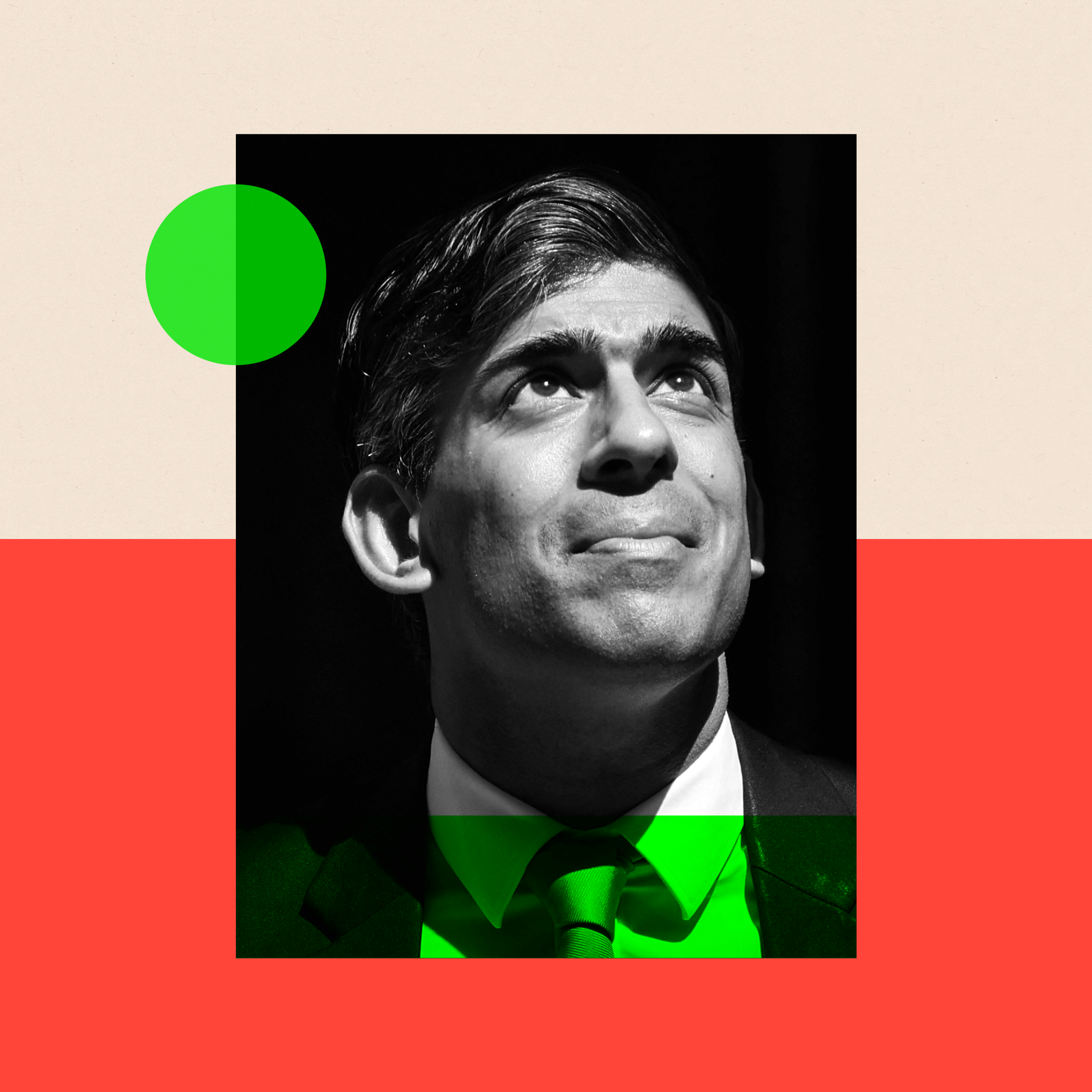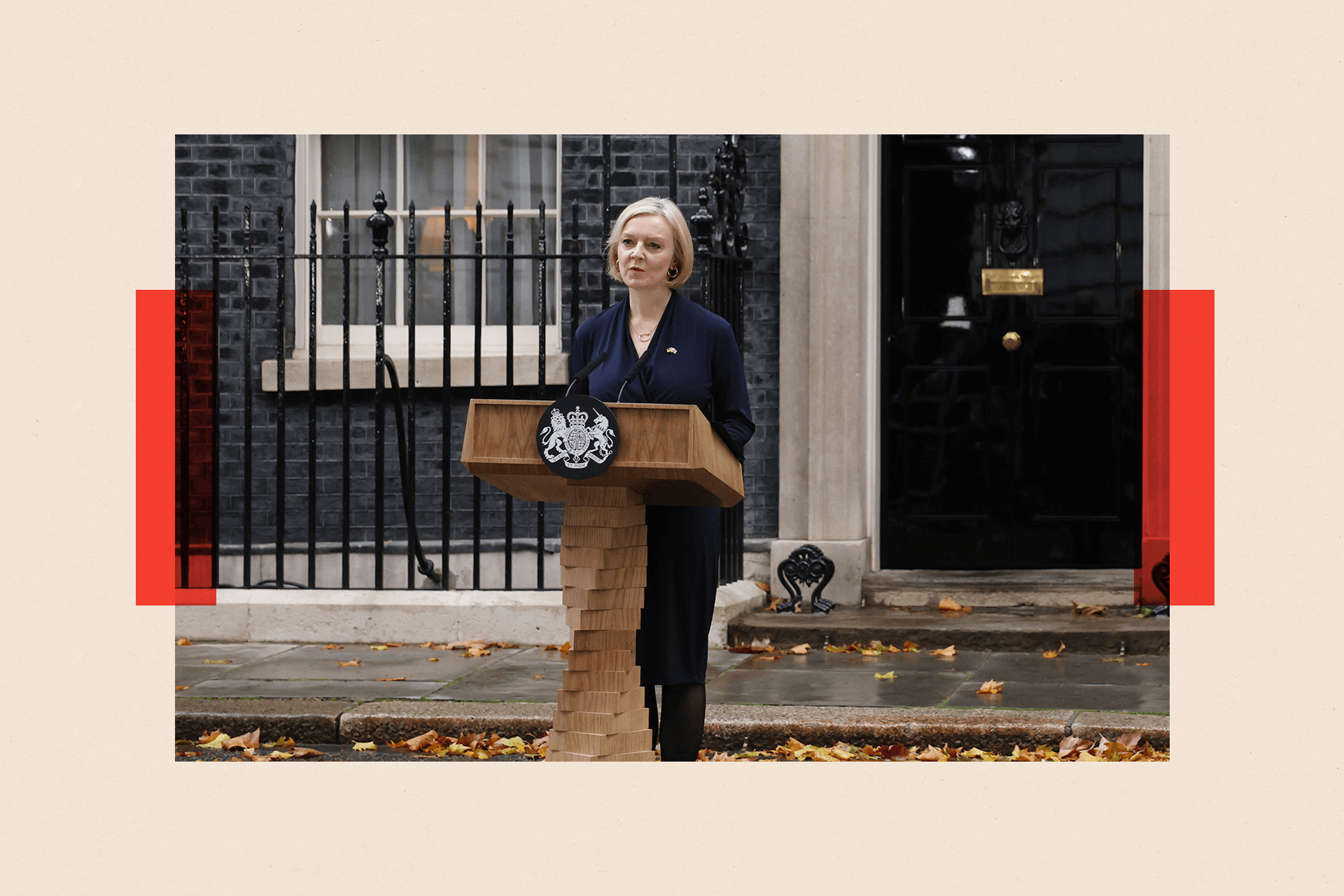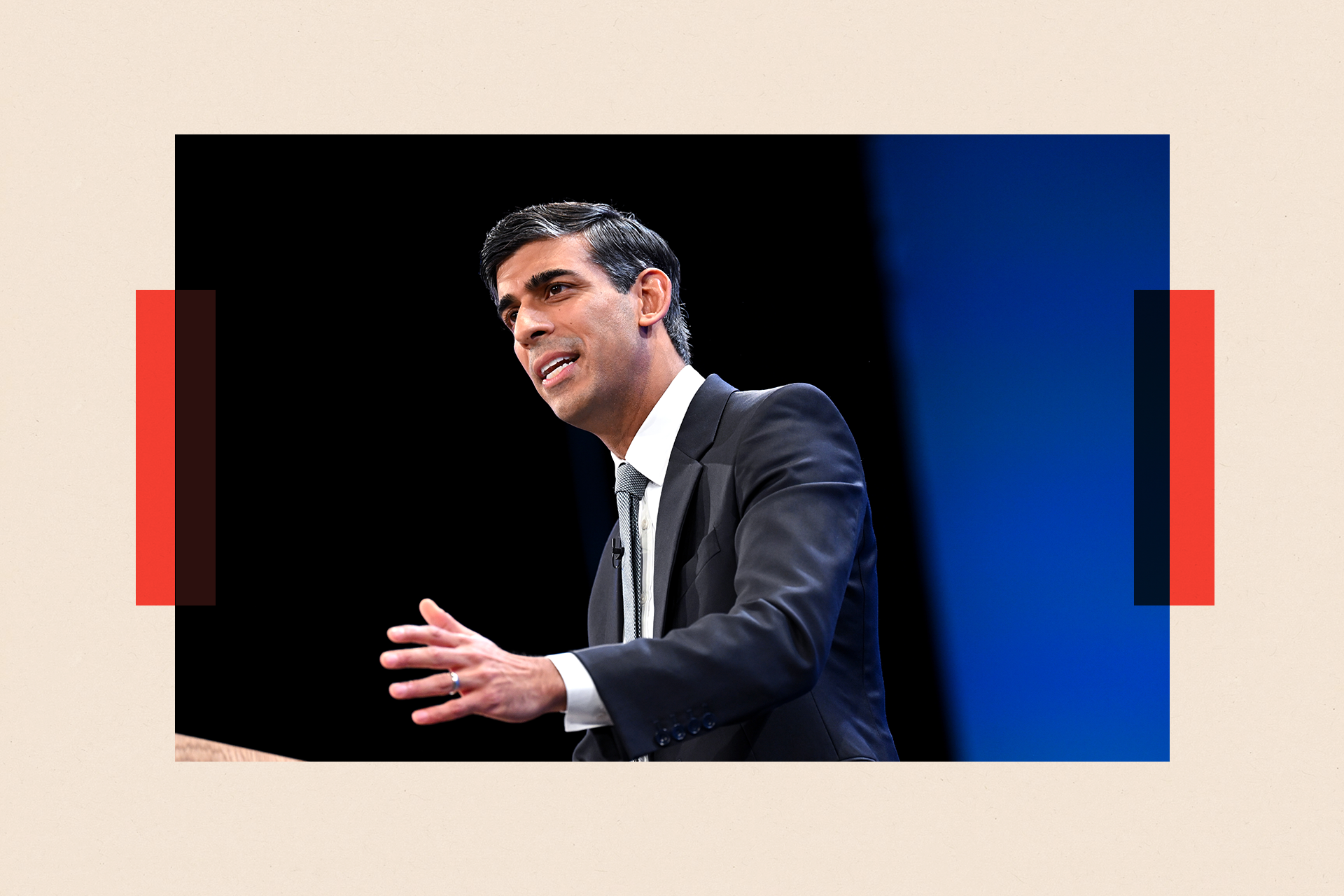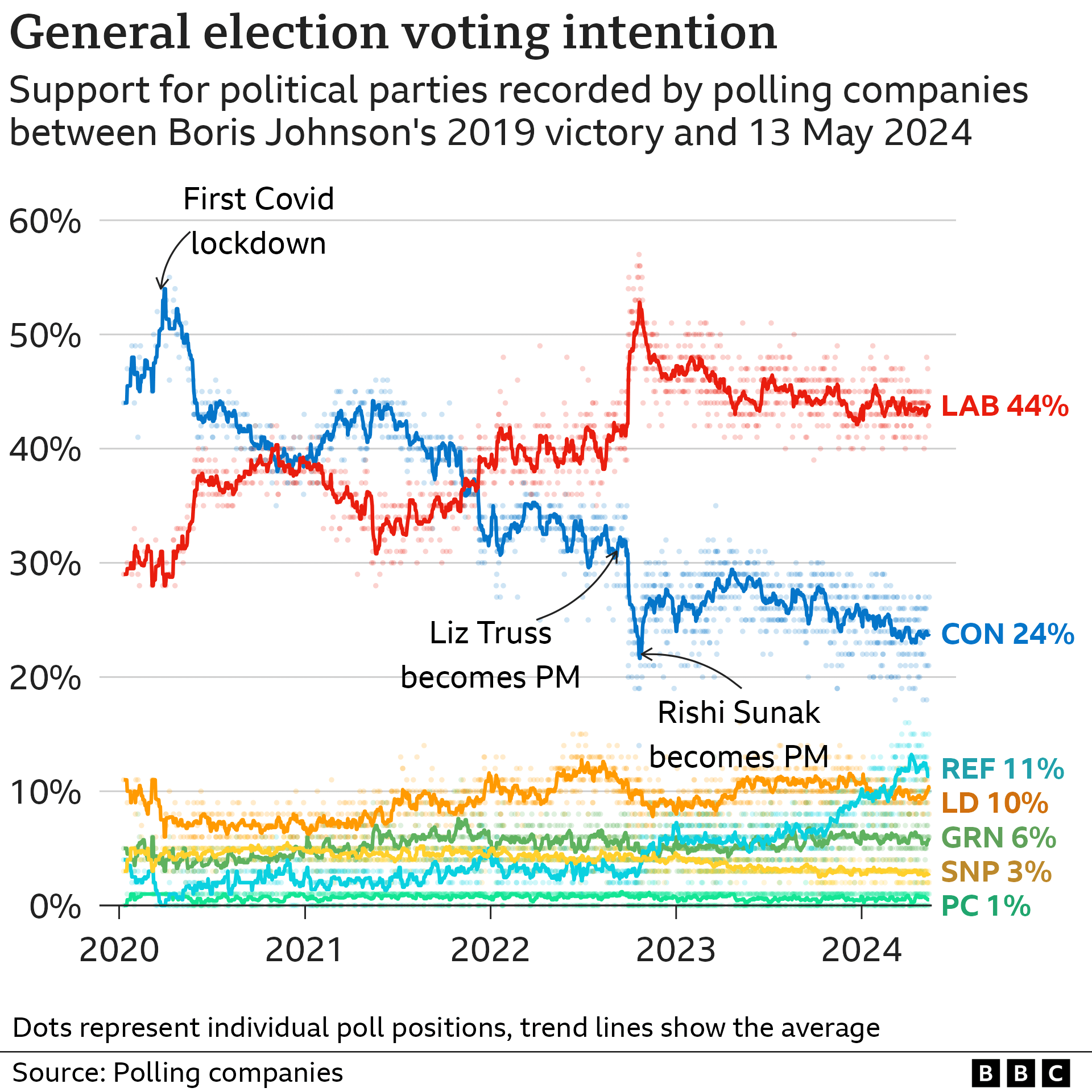
"He's like a children’s TV presenter - the more people see, the more they don't like."
This comment comes not from an opponent of Prime Minister Rishi Sunak but a supporter, who acknowledges things have not gone as they would have liked.
In a wide-ranging speech earlier this week, the prime minister attempted to draw vivid dividing lines between his government and Labour. It was a reminder that we are hurtling towards an election sooner rather than later.
The Conservatives had hoped they'd be closing the gap by now. So why has project Sunak failed to fire? Is it his personality, is it the battered party he took over or is it that the public has simply had enough?
I've spent the past fortnight speaking to 20 people who have worked up close with Rishi Sunak.
These are not disgruntled MPs or those who wished him ill from the start. They are ministers, staffers and officials (either current or former), who believed the Sunak project had a chance of turning things around, however slim that chance.
A few genuinely believe Mr Sunak may yet be his party's saviour and others stress that he inherited appalling political gravity. But others are not so kind.

Sign up for the Off Air with Laura K newsletter to get Laura Kuenssberg's expert insight and insider stories every week, emailed directly to you.

After the meltdown of the Liz Truss administration, he formed a government, kept the markets happy and worked out Northern Ireland, one insider points out.
If you think back to the wild moments of autumn 2022, that is no mean feat. "He followed advice to treat it like a coalition government at the start, to stabilise the ship," a former minister tells me.
One Whitehall insider said they "slept easier" when he moved into No 10.
"He is a decent man who is not in it for himself. He is all duty and hard work. I never saw him try to play the upside to gather power."
Many of the sources I spoke to told me he is "the cleverest person in the room", or the "smartest person in the meeting". One of his colleagues reckons he is "frighteningly well briefed... he's unmatched".
Gordon Corera: China's spy threat is growing
- Published15 May 2024
Faisal Islam: Is the US economy doing too well?
- Published16 May 2024
Rishi Sunak is an unusual politician. One example is the story of Carol and Jo. During the early part of the pandemic, Rishi Sunak made almost hourly calls to them. They were relatively junior civil servants working on designing and building the new system for furlough.
This was the chancellor taking personal and painstaking care with the details of an important new policy.
He'd host massive Zoom calls, and ask for tiny details from the desk officers directly responsible for particular pieces of policy, rather than rely on more senior civil servants.
I can't emphasise enough, for a top level politician, this is not normal behaviour. They normally prefer making decisions to trying to master all the details. But his style of including officials no matter their status, meant "the Treasury loved him from day one", according to a senior figure.
When Rishi Sunak arrived in No 10, the details man, apparently shorn of the ego of so many at Westminster, made politics a little more normal again.
His style had made him extremely popular as the Chancellor. There was a point when he "had net favourability in every part of the country", one insider recalls.

Sunak - who fronted the Eat Out to Help Out scheme - was a popular chancellor
He was more popular than the Tory Party and the hope was that he could pull the party's ratings up to his level. But it is the opposite that has happened.
One of Rishi Sunak’s mantras is "Politics is like the stockmarket – believe in the fundamentals, not the noise", a hangover from his past as a hedge fund manager. He reckons the small ups and downs of Westminster don't matter compared with the long-term trends.
And after three months in office, in January 2023, it was time for Mr Sunak to define the substance. He announced his now famous five pledges: he vowed to halve inflation, grow the economy, reduce national debt, cut waiting lists and stop the small boats.
The thinking was to show an unflashy politician who would calmly make vows and keep them. He would under-promise and over-deliver, in his typical mashup of political and management speak.
"The people's priorities are the Government's priorities," the PM said.
There are those who insist this wasn't merely politics by polling metrics. According to one Cabinet minister: "It was a bit of both - what focus groups wanted and what he believed in."
But others point to this moment as where things started to go wrong.
Some colleagues believe it was a shopping list of pledges that was never going to excite or persuade. "The five pledges were rushed out the door in January," a party veteran tells me. "He should have gone harder and bolder."
Others reckon Mr Sunak picked the right issues, but that his central message has failed because while inflation has halved, he hasn't yet been able to tick all five things off his list. "He chose hard things, and he sticks to his guns, even if it’s harder and takes longer," a defender says.

Liz Truss resigned as prime minister after just 45 days in office
After Boris Johnson’s bluster, and Liz Truss' hundred-mile-an-hour ideological experiment, Rishi Sunak’s business-like, non-ideological approach could have seemed like an advantage – thank God for a grown up, eh?
But for some, there's the problem.
"The most successful politicians at the very top level are the ones who have very strong beliefs and instincts – his approach looks like a series of transactions or problems to be solved," a former official who admires Sunak told me.
Another source who worked closely with him said: "He thinks that working really hard and being good is enough. Being PM is art, not science - and he is no artist."
"We’re like a government of civil servants," a serving minister tells me.
What started out as Rishi Sunak’s advantage now often seems like a negative.
'Bunker mentality'
It's not been an easy journey for a prime minister whose life has been defined until now by hard work and success. With those sky-high ratings as chancellor came "a belief that you are amazing and good", according to one insider.
There is a sense of frustration around his operation that somehow it's not quite fair that his hard work hasn't come good.
"He is thin skinned, he can't cope with people disagreeing with him," one source said. "He’s surrounded himself with people who are friends and think he's great. So they all just reinforce each other."
"There's an awful bunker mentality – it's a very weird time," another minister says.
The lack of political progress is not for want of trying. In the summer of 2023, No 10 decided to try to set a new narrative: the country would see the "real Rishi". It would be a chance to create his own agenda rather than be just the PM who cleared up the mess.
It was always a stretch to bill Mr Sunak as the "change" candidate, when the Conservatives had been in power for so long, but Boris Johnson had pulled it off.
Sunak "sat down in the summer to think about what his legacy should be", a minister at the time tells me. He came up with what the minister described as a series of "eclectic ideas" that included banning smoking, long-term reform of A-Levels in England and scrapping a major chunk of HS2, all co-ordinated with a big conference rebrand. Despite weeks of build-up, it fell flat.

Sunak used the Conservative party conference to announce he would scrap the northern leg of HS2
"I don’t know a single MP who wanted to put any of those things on their leaflets. It just showed he didn't really know where he wanted to go."
"It was one of those moments where you look at it," another current cabinet minister told me, "and think I'm not sure I object to any of it, but I'm not sure I see the point of it."
There was a palpable sense that week among Conservative ranks, if this is the real Rishi, is that really it?
It's not even clear it made the main man himself happy.
"He started to sound a bit more self-pitying," another politician who knows him well tells me.
"He felt like the world was on his shoulders. He had nobly stepped up to do it when no-one else wanted it. No-one is forcing you to do it. That’s just an annoying approach."
What nobody disputes is that Rishi Sunak inherited a political party in a huge mess.
Many of the sources I've spoken to say the state of the Conservative Party is Rishi Sunak's number one problem. There's a whole generation of MPs who learned the habit of sniping at each other in public. "The number of scars that everyone carries, that’s been the hardest thing to overcome," one No 10 insider says.
Another former minister suggests Sunak's appeal for discipline and order in the party was destined to fall on deaf ears because many believe he was part of the effort to unseat Boris Johnson.
One cabinet minister talks me through all the factions in the party, none of them tied particularly to Rishi Sunak, each more grumpy than the last. "The red wall lot who are proper panickers; 100 or so ex-ministers on the backbenches, most of whom think they should be PM; the Truss gang who just want Rishi to be embarrassed; and the Johnson gang who still blame Sunak for their hero’s downfall."
One minister tells me the prime minister is not particularly a creature of the party: "No-one feels Rishi is a leader, even if he is trying his best."
But has he done enough to try?
Rishi Sunak's choices at his autumn reshuffle last year might have been a moment when he had a chance to shake the party out of its doldrums.
Bringing back David Cameron grabbed plentiful headlines and reassured some parts of the Tory party that "the grown ups are back". He hung on to Jeremy Hunt, and experienced ministers like Grant Shapps and Steve Barclay. He promoted a few younger allies, like Clare Coutinho and Laura Trott.
But in terms of public perception, did the return of David Cameron achieve much other than undermining Rishi Sunak’s claim to be the "change candidate"?
"It was the turning point," one cabinet minister tells me - but not in a good way. "If you are going to show change and reset and refresh, you have to appoint more people like Clare Coutinho, not Grant Shapps."
Grudges and unhappiness
The diplomatic way of describing the atmosphere in the Tory party in 2024 according to a loyal Sunak insider is this: "We have to work to counter a lot of noise from lots of bits of the party.
"When you are in charge during a difficult time, people are frustrated, the leader will always get some blame for that. I think people think he is a decent guy who is trying hard."
By any measure, the party has been consumed by grudges and unhappiness.
There's a joke doing the rounds in Westminster. Have you heard the one about the Conservative MP who has just published a letter? It says he is standing at the general election!
More than 60 Conservative MPs have announced they're not standing again, sometimes because of retirement or the prospect of losing, but many of them are simply exhausted by the tensions and the tantrums.
And here’s the irony: one of Rishi Sunak’s strengths early in his political career was that he wasn’t identified with one particular political faction or tribe. He was seen as highly competent, pleasant, destined for high office, not invested in the nonsensical game-playing of SW1.
Yet while he has a strong and powerful group of loyal advisers and officials, and a core of the party who thinks he is highly capable, there is no sense of a political army who will battle to win.
The broad coalition of voters that Boris Johnson was able to create was a stretch that perhaps no-one would have been able to hold together.
"You can’t dump Theresa, Boris, Liz and install another leader and expect the public to go 'thanks very much, you’ve done a great job'," says one of those I spoke to. "That has created utter carnage."
Mr Sunak's most ardent backers say that after the Tory party’s many bouts of political madness in the past few years, "the public just doesn’t want to listen".
"It's just about the pendulum swing - it is not about the party, and the PM's personality is fine," one loyalist tells me. Another felt things were negative, despite progress on those early pledges. "There is just a cynicism, which applies to all parties."
Nobody is claiming that turning the mood of a public that feels hard up and cross is easy. But Mr Sunak's style, one of his admirers says, has felt like an uncomfortable clash with that: "You see a very happy, wealthy person - in a national context that is not appropriate."
One source told me: "You can't blame the public, if you voted for us in 2019 and you thought we'd build you a new hospital and you look across your road and we haven't, then that's not on the public. They are disappointed."

Rishi Sunak is struggling to reduce Labour's lead in the opinion polls
So what happens next? Mr Sunak and his team are putting a lot of stock in being able to show the economy is shifting for the better. They need that to cut through.
"He's happiest when he’s doing stuff," one of his confidants tells me. He has a spring in his step with recent announcements on welfare, defence, and much better numbers on the economy, they tell me. Mr Sunak’s set piece speech on Monday marked another attempt to shift the argument, to turn the fire on Labour, inviting comparisons between himself and Keir Starmer.
It is true that a lot could go wrong for Keir Starmer.
The economy going "gangbusters" (not my word, that was the ONS Chief Economist Grant Fitzner last week) may yet carry real sway with the public.
Voters in the 2020s are volatile. But does the eternally outwardly cheerful Rishi Sunak really think he can pull it back?
"I think he is fairly sure that going from where he is now to winning is a stretch," says one source.
Other Conservatives hope that under the crazy pressure of a general election campaign, the public will be less impressed with Keir Starmer than the polls currently suggest. "He’s like a plastic tree - he looks good from a distance but the closer you get, you realise he’s not the real thing," they snipe.
As things stand though, there is no doubt the initial hopes of Project Sunak have been dashed. Remember that by this stage they reckoned they would have been closing the gap on Labour, and looking competitive in an election. That may yet come. But the sense that Rishi Sunak could have represented a powerful fresh start has gone.
"He could have been that game-changer leader," one of those who believed in him told me. "The Tories choosing an Asian leader is such an amazing opportunity potentially, and perhaps it's yet again another example," adding with a brutal comparison "that as with Gordon Brown, the guy who is the number two is actually the number two."
Rishi Sunak will not give up without a fight. The shopping list of demands was always a hefty one - a leader required to settle the nerves of the financial markets and the country after weeks of market chaos, to pull together a political party after years of fighting amongst itself, and then to win over a cynical and exhausted public after waves of crises and self-inflicted calamity.
The common denominator of political events in the last five years is they have been hard to predict. Despite the polls it is way too soon to say it's game over for Project Sunak.
Some reflect it was a job that was perhaps always going to be bigger than just one man. Others still wonder if that had to be the case.
But in the end, politics is not like the stock market. Its fundamentals are a tangle of philosophy, sentiment, emotion and argument about what has gone before, as well as the now.
Put like that, for many around Rishi Sunak, the fundamentals don't look so good after all.
BBC InDepth is the new home on the website and app for the best analysis and expertise from our top journalists. Under a distinctive new brand, we’ll bring you fresh perspectives that challenge assumptions, and deep reporting on the biggest issues to help you make sense of a complex world. And we’ll be showcasing thought-provoking content from across BBC Sounds and iPlayer too. We’re starting small but thinking big, and we want to know what you think - you can send us your feedback by clicking on the button below.
Get in touch
InDepth is the home for the best analysis from across BBC News. Tell us what you think.

